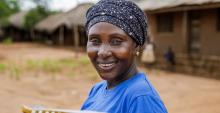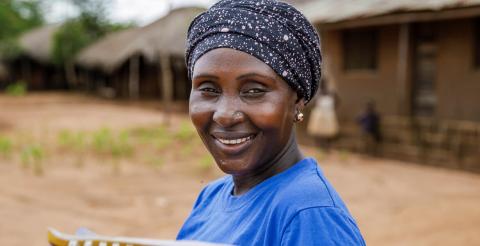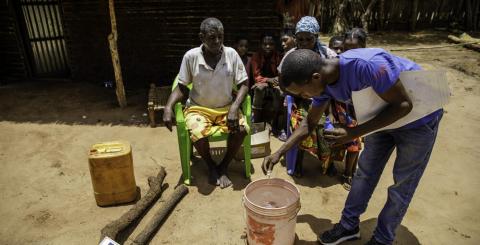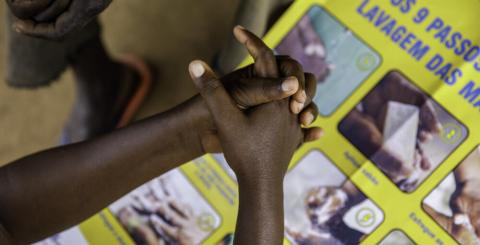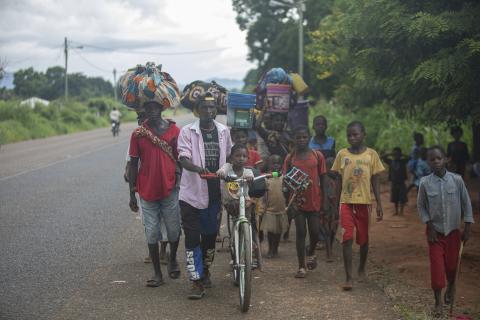Basic
In Mozambique, trained volunteers build a bridge between the public and the health system. Because they enjoy greater trust and credibility, they are able to raise awareness about hygiene measures and help control the spread of cholera.
Content
Content Media
Content Text
“Today I learned how to wash my hands thoroughly with soap and water. If I don’t have any soap, I can use ash,“ says Rosalina Salimane. The 60-year-old lives in Metoro, a town in the Cabo Delgado province in northeast Mozambique. Rosalina had a visit from one of the trained volunteers who as part of SolidarMed’s current cholera project go from door to door to educate people about hygiene measures to help contain the cholera outbreak which has been raging since last December. She also knows that if people have diarrhoea, they should seek medical attention.
Casimiro Sanli was also visited by one of the volunteers: “Today they showed me how to treat water with Certeza, a disinfectant, and how to wash my hands properly with soap. They also showed me how to open the pit to dispose of rubbish and how to cover the latrine.” He often attends the presentations by volunteers as he believes it is important that people are aware of how diarrhoeal diseases can be prevented. “Many people still don’t understand it very well,“ he says. He adds that there have been cases of cholera in his neighbourhood where people have needed hospital treatment.
Content Media
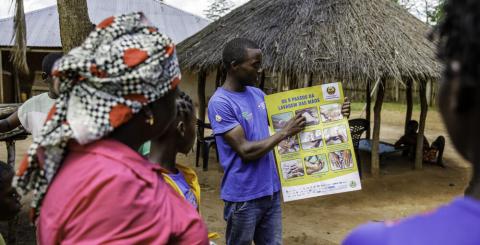
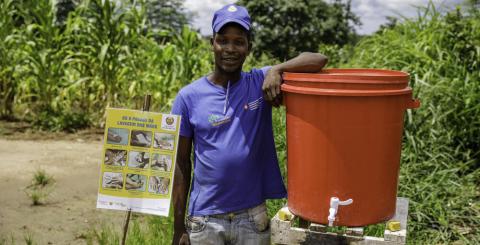
Content Text
Twenty-six-year-old André Paia lives in the same neighbourhood as Rosalina Salimane and Casimiro Sanli and is one of the trained volunteers. In reference to his role as a trained volunteer, André Paia says: “The fact that I don’t work for a company actually motivated me to get involved. I’m fighting for the welfare of society”. The young man has been involved since January. “Thanks to the information I give people, they know they need to go to hospital to seek treatment,” he explains. André Paia gives talks on hygiene practices and hands out equipment such as hand sanitiser and water disinfectant. Even if not everyone he talks to wants to implement his tips, he is proud of his work: “I’m really happy that I can play a part in improving the community.”
Zitat
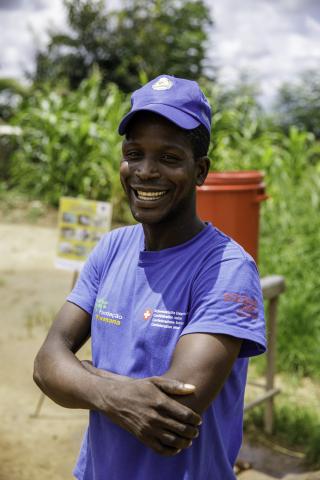
Content Text
Even in Switzerland, there is scepticism and sometimes mistrust towards the authorities, as became clear recently during the Covid-19 pandemic. In the current cholera outbreak in Mozambique, SolidarMed is working with the local organisation Wiwanana. They believe in the method of using trained volunteers to raise public awareness. The volunteers act as bridge builders between village communities and the health authorities. Their local knowledge and contacts mean they can build trust and empower the local population. They are therefore a key part of the health system and play an important role in containing the cholera outbreak.
Content Text
Cholera
According to the World Health Organization (WHO), cholera is an acute diarrhoeal disease that can kill within hours if left untreated. The disease mainly affects people with inadequate access to safe water and basic sanitation as it is transmitted through food and water contaminated with the vibrio cholera bacterium. WHO estimates that up to four million people contract cholera every year, of whom 143,000 die. Mild cases can be treated with a rehydration solution, while severe cases need intravenous fluids and antibiotics.
Cholera originally came from the Ganges delta in India and spread throughout the world in the 19th century. The first six pandemics killed millions of people. The current seventh pandemic started in 1961. Switzerland was also affected by cholera in the 19th century. The disease was controlled through improved sanitation in cities in the late 19th century.
Content Text
“In our projects, one of the things we aim to do is change people’s behaviour. This isn’t possible if you don’t engage with communities first. For example, people need to understand that a hospital is better equipped or offers new services,” explains Ilse van Roy, head of programmes at SolidarMed. For example, villagers in the project regions in Lesotho and Tanzania are informed in advance about when the mobile clinic will be in the village so that they can take advantage of the opportunity. “This is why our cooperation with Wiwanana in Mozambique is so important. The local population doesn’t trust the authorities. As the volunteers come from the same neighbourhood, understand the context and speak the same language, local people trust them,” explains van Roy.
Zitat
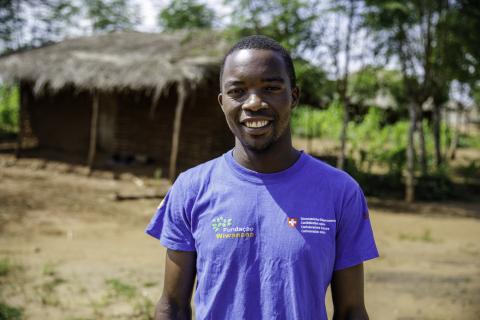
Content Text
Gilda Alves highlights the importance of the role played by trained volunteers. The 32-year-old has seen how things have improved in her own community: “We’ve changed a lot. Before, some people didn’t have a latrine, now they do. There are now waste disposal sites and handwashing stations and people use hand sanitiser.“ She herself had cholera in 2019 and needed hospital treatment. Now she can help those affected. “I visited the mother of a sick child and advised her to go to a health centre,” she explains. But before setting off with her child, Gilda Alves advised the mother to boil water and add a spoonful of sugar and a pinch of salt and to give the mixture to her child if they got diarrhoea on the journey. “The child has now made a full recovery,” she says.
Content Text
Assane Marcelo is pleased with the response from local people. “We teach people to keep their homes clean, and to wash dishes, their hands, and fruit,” explains the 30-year-old volunteer. He says he does the job because he wants to help people and that people understand that the information he gives them is important to their health. The fact that he himself had to be treated in hospital for cholera may help build trust when talking to local populations. Because, as volunteer André Paia explains, the main problem in communities is misinformation. “People can misunderstand and misinterpret information that they pass on to others. We therefore play a really important role in village communities,” he says. To continue to help people stay healthy in future, he hopes that SolidarMed will always be able to provide sufficient hygiene equipment so that cholera and other diseases that spread through poor hygiene can be contained.
